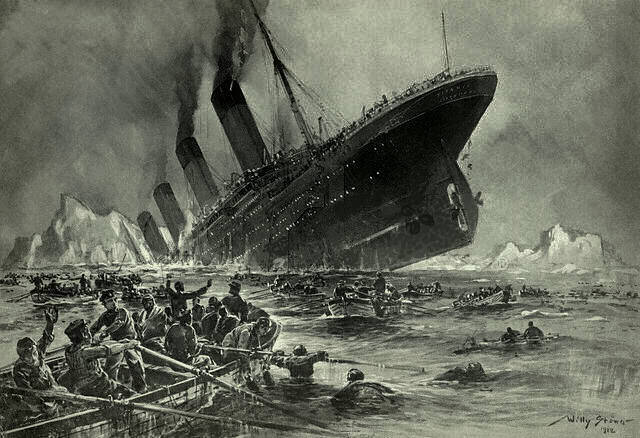1800s
Today in Labor History April 15, 1834: “Bloody Week” ended in Lyon, France, with a blood bath against insurgent silk workers. As a result, several hundred were killed.
April 15, 1889: A. Philip Randolph was born on this day. He was a labor organizer and president of the African-American Brotherhood of Sleeping Car Porters. Initially, no African-American newspapers supported his fight to unionize the Pullman porters.
Today in Labor History April 15, 1894: Bessie Smith was born on this day. She was one of the greatest blues singer of the 1920s and 1930s. Her parents died when she was young. Consequently, she began performing with Ma Raney to support herself. She died from a car crash at the age of 43. Edward Albee wrote a play, The Death of Bessie Smith (1959), based on the rumor that she died because a whites-only hospital wouldn’t admit her. However, she was picked up by an ambulance from a black hospital, where her right arm was amputated. She died from her wounds.
1900s
April 15, 1902: A peasant uprising in Russia led to the assassination of the head of the secret police.
Today in Labor History April 15, 1908: L’Ecole Renovee, Journal of the International League for the Rational Education of Children, debuted in Paris. Its founding members included Spanish anarchist educator Francisco Ferrer, creator of the first Modern Schools. Additionally, Anatole France, Peter Kropotkin, and biologist Ernst Haekel supported the movement.
April 15, 1909: IWW loggers in the Puget Sound area struck for better living conditions. They had been living in the mountains in tiny, rat-infested shacks.
1910s
Today in Labor History April 15, 1912: All the workers at Potlatch Lumber Company, in Bovill, Idaho, joined the IWW strike for better food and pay.

April 15, 1912: Eight members of the Musicians union died when the Titanic sank. According to survivors, they played their instruments until the end. Five weeks later, the union organized a concert to benefit the musicians’ families. The evening ended with “Nearer, My God, to Thee,” the hymn the musicians played as the ship went down.
Today in Labor History April 15, 1915: IWW Agricultural Workers Organization formed in Kansas City.
April 15, 1916: The American Federation of Teachers was created in Chicago. Eight locals signed on, under AFL Presdent, Samuel Gompers. The union grew quickly at first, chartering 174 locals in its first four years.
Today in Labor History April 15, 1919: The Telephone Operators Department of IBEW began a successful six-day strike across New England. It was the first women-led union.
1920s-1930s
April 15, 1920: Two men robbed and killed Frederick Parmenter & Alessandro Berardelli in South Braintree, Massachusetts. They stole $15,776.51. The anarchists, Sacco & Vanzetti, were blamed for the robbery. A kangaroo court convicted them and sentenced them to death.
Today in Labor History April 15, 1934: New York subway workers created the Transport Workers Union on this day. This was one of the first unions to join the CIO. The union started when IRA veterans sought the support of the Ancient Order of Hibernians (AOH) but were denied. So, they approached the Communist Party, which gladly gave their support. However, during the Cold War, the union’s leaders renounced their communist ties.
1940s-1950s
April 15, 1947: Jackie Robinson played his first Major League baseball game on this day.

Today in Labor History April 15, 1951: Strikes against fascist Spain spread through the Basque country and Catalonia. Over 100,000 workers risked prison or death, defying the government’s order to return to work.
1960s
April 15, 1961: The CIA arrived at the Bay of Pigs, Cuba. They came in order to bring workers’ rights to the so-called Workers’ Paradise.
Today in Labor History April 15, 1969: Thousands of welfare recipients marched in New York City because of cuts to their benefits.
Early 1980s
April 15, 1980: Philosopher and political activist Jean-Paul Sartre died on this day.
Today in Labor History April 15, 1981: Guatemalan soldiers murdered 69 people in Quiche province. This was part of the “silent” genocide against Guatemala’s Mayan population.
April 15, 1982: Guatemalan soldiers murdered 100 children and 73 women in Baja Verapaz. This was also part of the “silent” genocide against Guatemala’s Mayan population.
Jean Genet
Today in Labor History April 15, 1986: Author Jean Genet died on this day. Genet was a novelist, political activist and petty criminal. His book, The Thief’s Journal (1949), relates his experiences as a young prostitute and thief. That same year, the authorities tried to sentence him to life in prison for his ten convictions. Jean Cocteau, Jean-Paul Sartre and Pablo Picasso successfully petitioned the government on his behalf. In 1968, Genet was censored in the U.S. and expelled from the country. But he returned in 1970, upon an invitation by the Black Panthers. He stayed three months, giving lectures and attending the trial of Huey Newton. Later that year, he went to Palestine and visited refugee camps. He supported U.S. political prisoners Angela Davis and George Jackson. And he also supported the anti-prison, anti-police brutality work of Michel Foucault, in France.
Tiananmen Square

April 15, 1989: The Tiananmen Square protests began in China on this day. The demonstrations started in response to the death of a reformist leader, Hu Yaobang. Over 1 million people occupied the square at the height of the protests. In order to quell the protests, the government declared martial law and sent in the military. As a result, they killed hundreds, possibly thousands, of unarmed students and workers.
1990s
Today in Labor History April 15, 1998: Cambodian dictator Pol Pot died on this day. Under his rule, the Khmer Rouge committed genocide. They killed 2 million Cambodians, or 25% of the population.






Pingback: Today in Labor History April 21 - Marshall Law
Pingback: Today in Labor History May 12 - Marshall Law
Pingback: Today in Labor History May 23 - Marshall Law
Pingback: Today in Labor History May 24 - Marshall Law